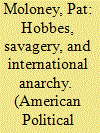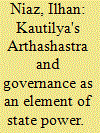| Srl | Item |
| 1 |
ID:
105180


|
|
|
|
|
| Publication |
2011.
|
| Summary/Abstract |
This article argues that Hobbes constructed the sovereignty acknowledged among European states on the supposition of the absence of sovereignty in the New World. The notion of international anarchy found in Hobbes before the twentieth century was not the anarchy of interstate relations later posited by realism, but the anarchy of prepolitical societies outside the ordered system of European states. The modern geography of sovereignty that Hobbes established is demonstrated with reference to the cartographic traditions that informed his representation of the state of nature and the civil state, and to the historical context of the law of nations as it was understood to manage colonial rivalry in the seventeenth century. By constructing savages as absolutely free individuals in the state of nature, he precluded their recognition as free sovereign states. He thus contributed a set of premises to natural jurisprudence that denied indigenous societies statehood and excluded them from the family nations. A sketch of the Hobbesian legacy among theorists of the law of nations and international law is made, showing how his motif of savage anarchy remained central to our conceptualization of the sovereign state within the international realm into the twentieth century.
|
|
|
|
|
|
|
|
|
|
|
|
|
|
|
|
| 2 |
ID:
085197


|
|
|
|
|
| Publication |
2008.
|
| Summary/Abstract |
The Indian subcontinent has long been subjected to invasions and extended
periods of warlordism, fragmentation and anarchy. The success of the invading
powers has often depended a great deal upon the prevalence of internal
dissolution. There is a direct link, for instance, between the collusion of certain
Afghan notables, such as the governor of the Punjab, Daulat Khan Lodhi, and the
establishment of Mughal imperial rule in the subcontinent in the 1520s. One can
|
|
|
|
|
|
|
|
|
|
|
|
|
|
|
|